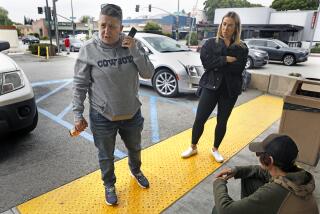Doctor: Surrogate Deal Stresses Child : Courts: Psychiatrist testifies Elvira Jordan has created an emotionally unhealthy environment for her daughter, 5, in part by showing hostility for child’s father.
- Share via
ORANGE — A 1991 court decision to award a surrogate mother joint custody of her daughter was akin to “splitting the child in half, Solomon-like” and has created a stressful environment that will likely lead to emotional problems as the girl grows older, a psychiatrist testified Wednesday.
Surrogate mother Elvira Jordan, 45, has a negative impact on her 5-year-old daughter, and the girl would fare far better in years to come without Jordan’s presence, court-appointed psychiatrist Debra A. Hill testified in Orange County Superior Court.
“I think we see troubles already,” Hill said, alluding to symptoms of depression and anxiety exhibited by the child, Marissa Jordan Moschetta. Later, Hill added, “I think the child is somewhat confused on what ‘mother’ is and what it means.”
The confusing and contentious battle for custody of Marissa began in June, 1989, when Santa Ana residents Robert and Cynthia Moschetta agreed to pay Jordan $10,000 to bear them a child. But after the Moschettas split up and the father alone took responsibility for the child, Jordan balked at the deal, which she said was made with the assumption of a stable, two-parent home for the girl.
A three-way custody fight ensued. In September, 1991, Superior Court Judge Nancy Wieben Stock stunned many family law and child development experts by ruling that the father and surrogate mother, who was impregnated through artificial insemination, would share custody.
Robert Moschetta appealed, arguing that Jordan had signed a contract surrendering her parental rights. Appellate justices disagreed, ruling that Jordan did retain a parental stake in her daughter’s future, although they did send the issue of custody and its format back to Orange County for a new trial. That new trial began Monday.
Both Jordan and Robert Moschetta are expected to take the stand this week to testify about their daughter and her upbringing. Hill’s testimony Wednesday portrayed Marissa as a shy girl who is suffering because Jordan is a narcissistic, undisciplined person who openly exhibits hostility toward Robert Moschetta and his new wife.
Hill described Moschetta and his wife as “enlightened” parents with “an investment” in Marissa’s child-rearing, while she characterized Jordan as a person too wrapped up in immediate gratification to nurture the girl to a healthy adulthood.
Jordan’s attorney, Diane Marlow, asked Hill if Marissa would be upset by losing contact with her mother. The attorney suggested that the separation would be too high a price to pay, but Hill disagreed.
“It’s important to think of the long-term impact on this child, not the short-term, impulsive impact,” Hill said.
Hill arrived at her findings in part by observing Marissa interact with both parents, attend preschool and go to dance classes. She said the child is standoffish among peers, and could encounter self-esteem and motivation problems in years to come.
Harold LaFlamme, an attorney appointed to represent Marissa’s interests, asked the psychiatrist if the girl would likely develop personality disorders. “Yes,” she answered.
Hill also pointed to Jordan’s trouble with the law as a negative influence on the girl. Jordan admitted in 1992 to committing welfare fraud and agreed to repay the government more than $8,500.
More to Read
Sign up for Essential California
The most important California stories and recommendations in your inbox every morning.
You may occasionally receive promotional content from the Los Angeles Times.













